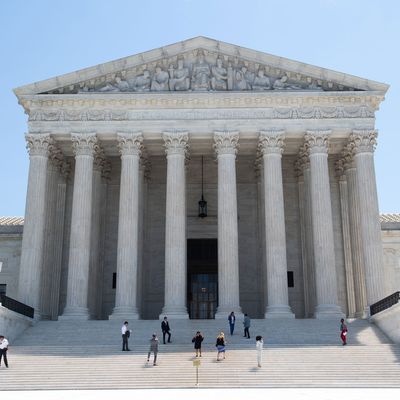
Dealing with a welter of disputes involving efforts by three congressional committees and a Manhattan prosecutor to gain access to the president’s tax and financial records, the U.S. Supreme Court agreed on Friday, without dissent, to take up three lower-court decisions that will test Trump’s particularly expansive ideas of executive immunity from legal proceedings and legislative oversight. SCOTUSblog’s Amy Howe explains:
The justices agreed to review three separate lower-court decisions that ruled against the president: Two of those decisions upheld subpoenas that would force the president’s accounting firm and lenders to turn over financial records that they have in their possession, while a third ordered the president’s accounting firm to provide prosecutors in New York City with his financial records, including his tax returns.
The subpoena to Trump’s accounting firm, Mazars, came from the House Committee on Oversight and Reform, while the subpoenas to Deutsche Bank and Capital One, two of Trump’s lenders, came from the House Financial Services and Intelligence Committees. The committees said that they wanted the records as part of their work, but Trump argued that the subpoenas do not serve a “legitimate legislative purpose,” as the Supreme Court’s cases require.
The subpoena from Manhattan district attorney Cyrus Vance also went to Mazars [seeking] several years’ worth of Trump’s tax returns as part of a state grand-jury investigation. After the lower courts rejected his efforts to quash the subpoena, Trump went to the Supreme Court, arguing that the subpoena violates the president’s absolute immunity from state criminal proceedings while he is in office.
The Court added the three cases to the list of those on which they will hear arguments next spring. A decision is expected by June, when the current SCOTUS term ends, ensuring that this potentially important decision will coincide with the presidential election season. As Adam Liptak notes at the New York Times, this will quite possibly be a landmark decision, and not just because of its effect on Trump and the legal and political bloodhounds who have been pursuing his suspect records for years:
[The ruling] could require disclosure of information the president has gone to extraordinary lengths to protect. Or the justices could rule that Mr. Trump’s financial affairs are not legitimate subjects of inquiry so long as he remains in office. Either way, the court is now poised to produce a once-in-a-generation statement on presidential accountability.
The case will test the independence of the court, which is dominated by Republican appointees, including two named by Mr. Trump. In earlier Supreme Court cases in which presidents sought to avoid providing evidence, the rulings did not break along partisan lines.
That could change in this case. Trump’s secrecy about his business practices and taxes is as close to his heart as the border wall, and pressure on SCOTUS’ conservative majority to protect it will be intense, along with loud claims that policing the executive branch is none of the Court’s business.






























